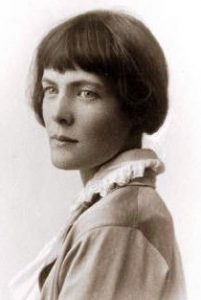Consider this quotation from Amy Lowell:
The definition of Vers libre is: a verse-formal based upon cadence. To understand vers libre, one must abandon all desire to find in it the even rhythm of metrical feet. One must allow the lines to flow as they will when read aloud by an intelligent reader. Or, to put it another way, unrhymed cadence is “built upon ‘organic rhythm,’ or the rhythm of the speaking voice with its necessity for breathing, rather than upon a strict metrical system. Free verse within its own law of cadence has no absolute rules; it would not be ‘free’ if it had.”[i]

The academic tone of this definition matches her tone in the quote from last month’s post on “The Poet’s Trade”. Lowell “never attended college because her family did not consider it proper for a woman to do so,”[ii] and this definition speaks in the tone of the auto-didact in its statement that “One must allow the lines to flow as they will when read aloud by an intelligent reader.” As long-time readers of these posts will know, I don’t disagree with the primacy that statement gives to reading verse aloud. It’s the overall tone, the insistence on an “intelligent reader,” that betrays a certain in-group knowingness I associate with auto-didactism.
I would argue that the better part of that definition is what is quoted in the end, and I haven’t been able to find who is being quoted there, or whether Lowell is quoting herself; but the reliance on “the rhythm of the speaking voice with its necessity for breathing” fits better my understanding of English meter, with its Anglo-Saxon heritage of stress harnessed with its French insistence on a metrical foot, than the first part of the definition. And the statement “Free verse within its own law of cadence has no absolute rules” is perfectly descriptive of most of the verse of my contemporaries thatI read in “Poem-a-Day,” a poem-delivery service “Launched during National Poetry Month in 2006” which “features new and previously unpublished poems by contemporary poets on weekdays and classic poems on weekends.” The service comes from the “Academy of American Poets community. To learn about other programs, including National Poetry Month, Poem in Your Pocket Day, the annual Poets Forum, and more, visit Poets.org.”[iii]

So Lowell’s embrace of vers libre, and practice of it, and promotion of it, proved prescient for the whole century. But a closely allied practice, that of “imagism,” was not to prove so enduring. “Imagism” was Ezra Pound’s invention, primarily coined to sell the poetry of H. D. to Harriet Monroe, the editor of Poetry. “In 1905,” according to Wikipedia, “Pound presented her with a sheaf of love poems, under the collective title Hilda’s Book.”[iv] They had met in 1901, when she was 15 or so, and still in high school. He was about a year older. She began a study of Greek literature at Bryn Mawr in 1905. In 1907, when he would have been about 22 and she about 21, they engaged to marry. But “Her father disapproved of Pound, and by the time Pound left for Europe in 1908, the engagement had been called off.”[v] She traveled to Europe in 1911, and met up with Pound, and showed him some of her poems — six years after Hilda’s Book.
Pound and Richard Aldington recognized in H.D.’s poems their ideas of how poetry must be reformed. “In summer 1912, the three poets declared themselves the ‘three original imagists”, and set out their principles as:
1. Direct treatment of the ‘thing’ whether subjective or objective.
2. To use absolutely no word that does not contribute to the presentation,
3. As regarding rhythm: to compose in the sequence of the musical phrase, not in the sequence of a metronome.”[vi]
Pound sent poems of Aldington and H.D. to Harriet Monroe, for Poetry. She published Aldington’s in November 1912, and H.D.’s in January 1913. Here is one of H.D.’s poems from that initial publication, her first:
Orchard
I saw the first pear
as it fell—
the honey-seeking, golden-banded,
the yellow swarm
was not more fleet than I,
(spare us from loveliness)
and I fell prostrate
crying:
you have flayed us
with your blossoms,
spare us the beauty
of fruit-trees.
The honey-seeking
paused not,
the air thundered their song,
and I alone was prostrate.
O rough-hewn
god of the orchard,
I bring you an offering—
do you, alone unbeautiful,
son of the god,
spare us from loveliness:
these fallen hazel-nuts,
stripped late of their green sheaths,
grapes, red-purple,
their berries
dripping with wine,
pomegranates already broken,
and shrunken figs
and quinces untouched,
I bring you as offering.
In the summer of 1913, Amy Lowell came to London “to meet the new poets.”[vii] John Tytell quotes Harriet Monroe as saying that Lowell had “imperious ambition for a literary career.”[viii] What she did, in Pound’s view, was hijack “imagism.”[ix]
That can best be seen in the imagist credo Lowell published in her Tendencies in Modern American Poetry [x] in 1917, after having published three imagist anthologies featuring the poems of, from Britain, Richard Aldington, F. S. Flint, and D. H. Lawrence, and from America, H.D., John Gould Fletcher, and Amy Lowell. Compare the credo above with these principles, which Lowell quotes from the anthology she published in 1916, Some Imagist Poets, as follows:
“1. To use the language of common speech, but to employ always the exact word, not the nearly-exact, nor the merely decorative word.
“2. To create new rhythms — as the expression of new moods — and not to copy old rhythms, which merely echo old moods. We do not insist upon “free-verse” as the only method of writing poetry. We fight for it as for a principle of liberty. We believe that the individuality of a poet may often be better expressed in free-verse than in conventional forms. In poetry a new cadence means a new idea.
“3. To allow absolute freedom in the choice of subject. It is not good art to write badly of aeroplanes and automobiles, nor is it necessarily bad art to write well about the past. We believe passionately in the artistic value of modern life, but we wish to point out that there is nothing so uninspiring nor so old-fashioned as an aeroplane of the year 1911.
“4. To present an image (hence the name: “Imagist”). We are not a school of painters, but we believe that poetry should render particulars exactly and not deal in vague generalities, however magnificent and sonorous. It is for this reason that we oppose the cosmic poet, who seems to us to shirk the real difficulties of his art.
“5. To produce poetry that is hard and clear, never blurred nor indefinite.
“6. Finally, most of us believe that concentration is of the very essence of poetry.”[xi]
To these she adds a 7th principle in writing Tendencies in Modern American Poetry, one “which was not mentioned in this preface, [which] is: Suggestion — the implying of something rather than the stating of it, implying it perhaps under a metaphor, perhaps in an even less obvious way.”[xii] Here is a poem she urges as fulfilling this seventh criterion, by John Gould Fletcher:
The Well
The well is not used now
Its waters are tainted.
I remember there was once a man went down
To clean it.
He found it very cold and deep,
With a queer niche in one of its sides,
From which he hauled forth buckets of bricks and dirt.
This is her comment on the poem: “The picture as given is quite clear and vivid. But the picture we see is not the poem, the real poem lies beyond, is only suggested.”[xiii] And Lowell does not further elucidate what “the real poem” is, thus showing the way for several generations of high-school English teachers to explain poetry to their students.
Lowell, in her earnest way, formalized what Pound had tossed off as a means of intriguing Monroe into publishing Aldington and H.D. Wikipedia notes that “A glandular problem kept her perpetually overweight, so that poet Witter Bynner once said, in a cruel comment repeated by Ezra Pound and thereafter commonly misattributed to him, that she was a ‘hippopoetess.’”[xiv] That Pound was willing to attack his protegé with such malice illustrates the anger he felt towards her for having formalized his inspiration. That Lowell could recruit, pay and publish poets in her three anthologies entitled Some Imagist Poets so irritated him that he called her poets “Amygists” and rebranded his modernists as “vorticists”. He lost that battle of the brands.
“Lowell died of a cerebral hemorrhage in 1925, at the age of 51,”[xv] and I can’t say with any certainty that she died because of Bynner’s or Pound’s cruelty — but I think it safe to say that her formulation of vers libre, and of imagism, had a greater effect on contemporary American poetry than anything Pound wrote after their falling out.
But hold on, I hear you say: what about Pound’s Cantos?
Your turn.
____________________
[i] As quoted in “Lowes, Livingston John Conventions and Revolt in Poetry, 1919,” and posted on Wikipedia, https://en.wikipedia.org/wiki/Amy_Lowell, accessed 31 January 2017.
[ii] Ibid.
[iii] This is the fine print that accompanies every Poem-a-Day. There. Now I’ve done my part to advertize this service.
[iv] The biographical information in this section comes from the Wikipedia article on H. D., https://en.wikipedia.org/wiki/H.D., accessed 23 February 2017.
[v] Ibid.
[vi] Ibid.
[vii] Ezra Pound : the solitary volcano / John Tytell. — New York : Anchor Doubleday, 1987. p. 90.
[viii] Ibid.
[ix] Timothy Materer, from “Make It Sell! Ezra Pound Advertises Modernism.” In Marketing Modernisms: Self-Promotion, Canonization, Rereading / ed. Kevin J.H. Dettmar and Stephen Watt. Ann Arbor: University of Michigan Press, 1996, as quoted in http://www.english.illinois.edu/maps/poets/g_l/amylowell/imagism.htm, accessed 21 February 2017.
[x] Tendencies in Modern American Poetry. — New York : Macmillan, 1917, quoted by me as excerpted, with some silent correction of typos and punctuation, in http://www.english.illinois.edu/maps/poets/g_l/amylowell/imagism.htm, accessed 21 February 2017.
[xi] Ibid.
[xii] Ibid.
[xiii] Ibid.
[xiv] https://en.wikipedia.org/wiki/Amy_Lowell, accessed 31 January 2017.
[xv] Ibid.

I suspect if you asked an AmLit class for an influential American poet named Lowell more people would say Robert than Amy. I’ve always wondered if she was his mother. Wikipedia’s Amy Lowell article doesn’t mention Robert, but the Robert Lowell article lists Amy as a relative. Wikipedia contains a link to a google scan of Some Imagist Poets, and a link to Librivox recordings of Amy Lowell’s poetry. It says she was largely forgotten then rediscovered by feminist scholars in the 1970s, but that doesn’t mean she hasn’t been more influential than Pound. It may simply mean we don’t always know who our influences are.
How do you think Pound’s anger affected Lowell’s reputation? Was he more angry because she had taken his idea and formalized it, or because he didn’t think Imagism should be formalized? didn’t think of it as an -ism at all, just as a term he made up to attract Harriett Monroe’s attention?